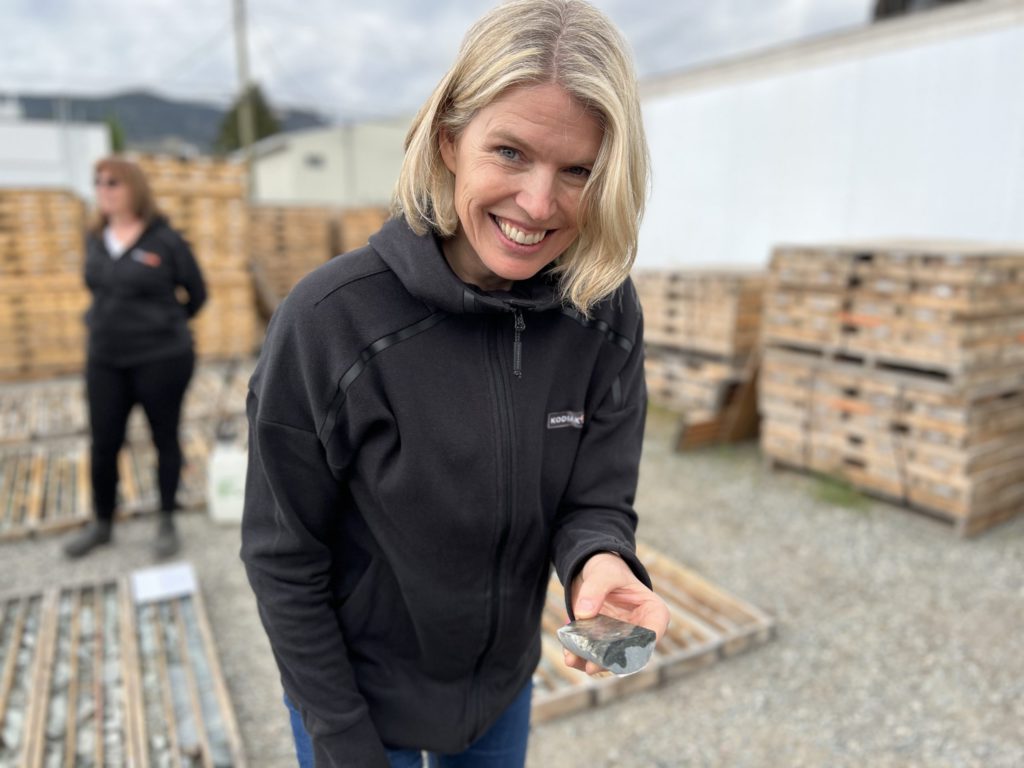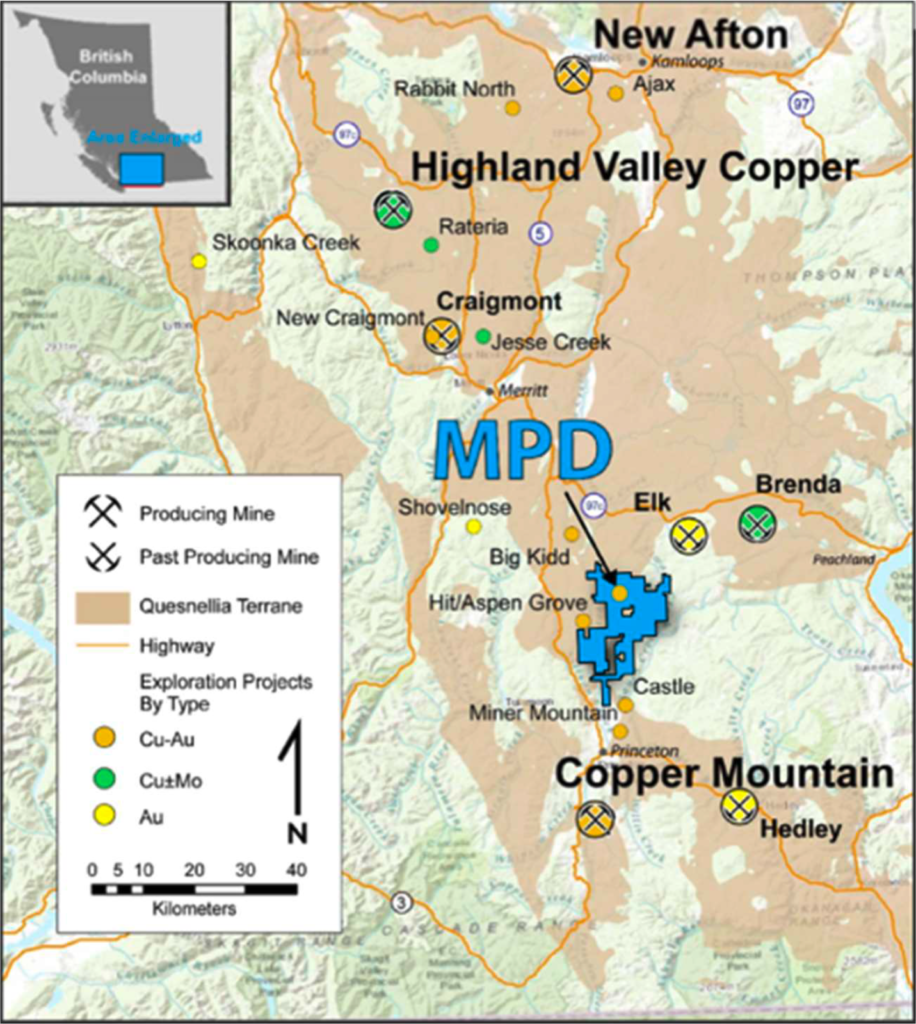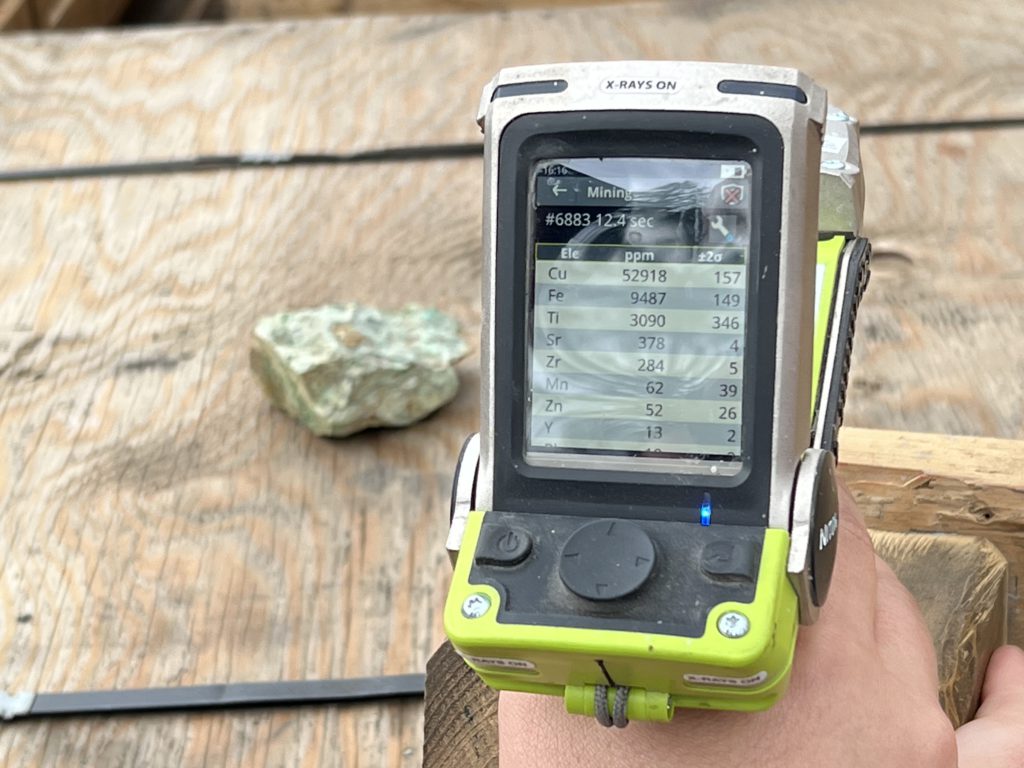Site visit: Kodiak Copper drilling to expand mineral footprint at MPD project in British Columbia

When mineral mastermind Chris Taylor gets behind a grassroots exploration project it behooves investors to sit up and pay attention – he did after all sell an Ontario pre-resource stage gold project for C$1.8 billion ($1.3bn) in cash and is looking to repeat that success with brainchild Kodiak Copper (TSXV: KDK; US-OTCQB: KDKCF).
Kodiak’s most advanced asset is its MPD copper-gold porphyry project in the Quesnel Trough in south-central British Columbia – a multi-centered porphyry system that is slowly giving up its secrets.
The explorer’s share price gathered momentum since 2020 after discovering the Gate Zone, which has high-grade mineralization within a wide mineralized envelope. President and CEO Claudia Tornquist tells The Northern Miner that while Kodiak could ostensibly work towards a resource estimate, its chosen strategy entails continuing with an aggressive drilling program using up to three rigs this year to find other Gate Zone-like porphyries on the property.
Kodiak was founded by chairman Taylor, the founder and CEO of Great Bear Resources which was acquired by Kinross Gold (TSX: K; NYSE: KGC) for its Dixie gold project early last year.
Tornquist says MPD hosts several targets with similar discovery potential, much like Great Bear was able to find the LP Fault zone where others had looked but couldn’t quite figure it out. Kodiak benefits from a consolidated land package, and is armed with new geotechnical data overlaying the historical data left by prior project proponents.
“Kodiak is in many ways a similar story to Great Bear. We took a project that lots of people had already looked at. Chris with his creativity and out-of-the-box thinking came up with a different approach, a different model and that led to a big discovery success,” Tornquist said during a recent site visit.
The company hosted a group of analysts and media representatives at its field office in Merritt, about three hours east of Vancouver, and the MPD project site, another hour south by forest service road. At the Merritt core shack, the geology team enthused about the most recent drill cores, while at MPD, tour attendees saw many blue-coloured rocks of azurite, malachite and magnetic magnetite scattered in kilometres-long trenches dug by previous explorers.
The project is near producing mines – Copper Mountain, Highland Valley and New Afton. And what’s more, Teck Resources (TSX: TECK.A/TECK.B; NYSE: TECK) took a 9.9% interest in Kodiak soon after the Gate Zone discovery was announced.
“Teck invested right after our discovery in 2020 and in our most recent financing they have been a very supportive partner,” Tornquist says.
Consolidated package
While the MPD property has seen more than 50,000 metres of drilling since the 1960s through to 2018, with previous operators including Newmont, Rio Tinto, Cominco and Antofagasta, Taylor was able to consolidate the separate land packages for the first time, allowing for the first detailed regional analysis of historical data.
Kodiak’s MPD project encompasses 226 sq. km and although it’s located amidst well-developed infrastructure in highly prospective copper country, the project had seen shallow drilling that rarely reached below 400 metres.

The property is in rolling, hilly terrain with a maximum elevation of 1,735 metres above sea level. The vegetation includes commercial stands of fir and lodgepole pine. A large portion of the property is covered by forestry cut blocks and logging roads which some of the geologists on the team say they often follow to prospect for mineralized outcrops.
The local infrastructure also includes a 238 kV power transmission corridor on the southwestern (Axe) portion of the property that parallels highway 5A.
The team identified many mineralized showings and trends with copper confirmed across several large areas by soils, rock, drilling and trenches.
The work culminated in 2019 with the company’s initial drill program with immediate success. The Gate Zone discovery hole returned 102 metres of 0.53% copper and 0.16 grams gold per tonne (or 0.68% copper-equivalent) which was the best hole in the property’s 50-year history.
By 2022, Kodiak had extended the Gate Zone discovery to one kilometre in a north-south orientation 350 metres east-west and to 900 metres deep. It also identified a 400 metre-long, parallel copper-porphyry trend at the nearby Prime Zone, and started testing the Dillard area.
Last year, Kodiak announced the high-grade gold-silver Beyer Zone discovery during trenching which returned 3.02 grams gold per tonne and 24.18 grams silver over 12 metres, and 9.11 grams gold and 24 grams silver over 2 metres.
Big game hunting
MPD has all the hallmarks of a district-scale, multi-centered porphyry system with several previously drilled targets with similar signatures to the Gate Zone yet to be tested, VP for exploration Jeff Ward tells the tour group.
He explains the copper-gold mineralization occurs as disseminations and fracture-filling sulphides hosted by variably to intensely altered porphyritic diorite, associated breccia/fracture systems, and altered intermediate volcanic host rocks.
The current drill programs are focused on determining the alteration and structural controls and the orientation of mineralization within each porphyritic system.
This year, the company has set itself a budget for 25,000 metres of drilling. The team has identified 18 prospective target areas, only three of which have seen significant drilling by the company – the Gate, Prime and Dillard zones.
Ward says the plan this year entails targeting the original MPD North claims, including the Man, Beyer, Dillard East, Blue, Sky and Eclipse areas. The MPD South claims (formerly called the Axe zone), include the 1516, South and West Zones.
Kodiak also plans to fly 25-line kilometres of new 3D induced polarization surveying and take about 1,500 soil samples to advance newer prospects to drill-readiness.
Further, in the Man Zone, new 3D induced polarization anomalies (chargeability and resistivity) define a drill target to a depth of 600 metres and below historic depths of drilling, according to Ward.
There’s more upside at the MOD South zone too. Ward says several porphyry copper-gold mineralization centres underlie the claims which host the highest-grade historical copper-gold values reported in drill core on the project. There were 111 metres of 0.56% copper at Adit, 124.5 metres of 0.38% copper and 0.22 grams gold per tonne at the West Zone.
“I’m as excited about MPD South as about Gate. With this round of drilling we’re going in with much more data and information. I mean we’ve already drilled into bornite – the holy grail for high-grade porphyry copper,” Ward says.
He says that like the Gate Zone, the MPD South zones exhibit corresponding chargeability and conductivity geophysical anomalies located on a north-westerly trending magnetic low structural break. “We’re paying close attention to the geochemistry which no-one had access to before due to the fragmented land package.”

Meanwhile, work last year confirmed significant copper-gold-molybdenum anomalies in soil at the 1516 target area, within a broader 2,200 by 400 metre anomalous zone identified by previous operators.
While Kodiak has chosen to strategically see how big MPD’s footprint and how high the grades can get before constraining a resource, Tornquist pointed out that GT Gold’s 2021 acquisition by Newmont (TSX: NGT; NYSE: NEM) for $393 million was a good example of what could potentially happen. GT Gold had made two significant discoveries on the Tatogga property, in B.C. – Saddle South, a precious metal rich vein system and Saddle North, a gold-rich copper porphyry system.
“They got taken out the moment they released a resource,” Tornquist says. “We’re still in discovery mode – if Gate is our gateway, there is plenty more porphyry upside to seize.”
Kodiak shares are down nearly 40% since the start of the year, but are still up 27% since the Gate discovery was announced in 2020. The stock had tested C50¢ and C$1.48 over the past 12 months and has a current market capitalization of C$44.7 million ($32.9m).
{{ commodity.name }}
{{ post.title }}
{{ post.date }}




Comments